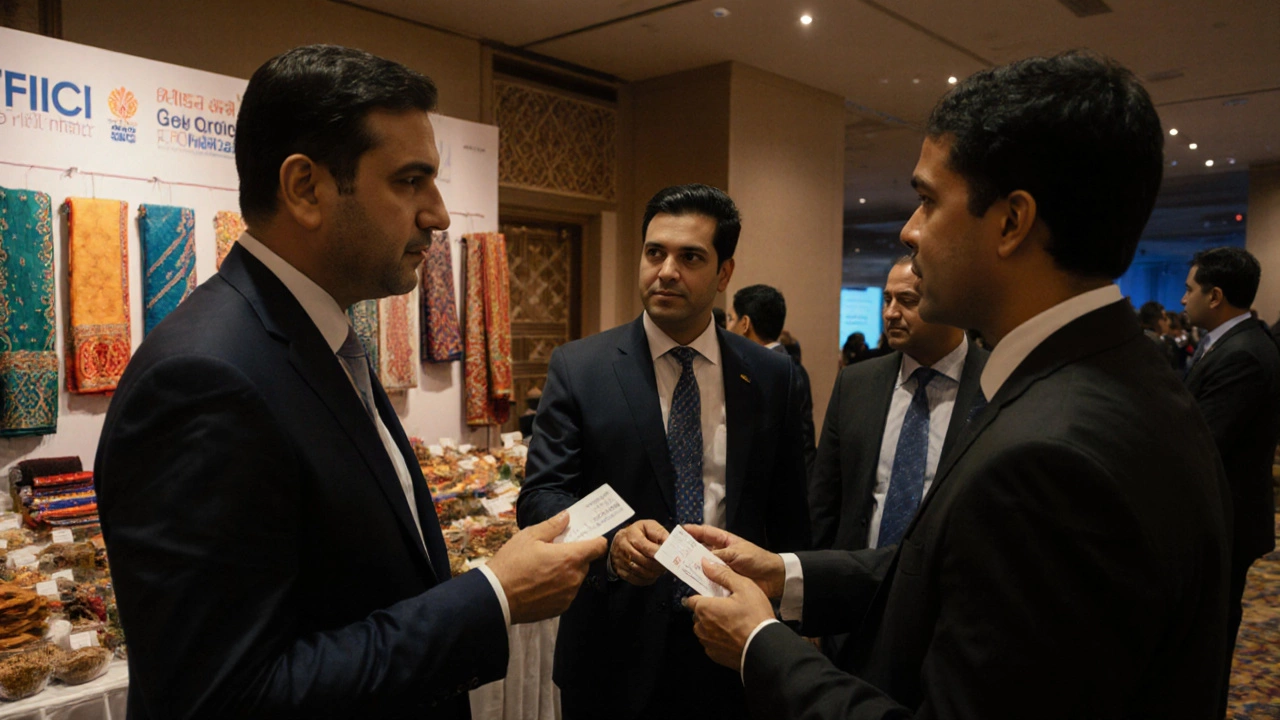Export Business Valuation Calculator
Estimate Your Business Value
Calculate realistic valuation based on Indian export industry standards. Input your EBITDA and client concentration risk to see potential sale range.
If you’ve built an export business in India and now want to move on - whether it’s retirement, a career change, or chasing a new opportunity - finding the right buyer isn’t just about listing your company online. It’s about positioning it right, reaching the right people, and proving its real value. Many owners think their business is worth more than it is, or worse, they wait too long and lose momentum. The truth? Buyers don’t chase businesses. They chase businesses that are clean, profitable, and easy to take over.
Know What Your Business Is Really Worth
You can’t sell what you don’t understand. A simple turnover number won’t cut it. Buyers look at EBITDA - Earnings Before Interest, Taxes, Depreciation, and Amortization. For export businesses in India, a healthy multiple is usually 4x to 7x EBITDA, depending on client diversity, contracts, and growth trends. If your business relies on one buyer in the U.S. or one product line, your multiple drops fast. Buyers hate concentration risk.
For example, a textile exporter making ₹1.2 crore EBITDA annually with 12 steady clients across Europe and Australia might sell for ₹6-8.4 crore. But if 70% of revenue comes from one buyer in the UK who’s threatening to switch suppliers, the offer might drop to ₹3-4 crore. That’s the difference between a sale and a fire sale.
Get Your Books in Order
Buyers will dig into your financials, tax filings, GST records, and export documentation. If your books are messy - missing invoices, unregistered shipments, mismatched bank statements - you’ll lose credibility fast. Most serious buyers hire due diligence firms. They’ll check:
- Consistency between GST returns and export declarations (ICEGATE data)
- Bank statements matching export receipts (foreign currency inflows)
- Valid DGFT licenses and IEC code status
- Clear title to machinery, warehouse leases, and IP
If you’re not ready for this audit, fix it now. Clean records don’t just help the sale - they build trust. Buyers pay more for transparency.
Who’s Actually Buying Export Businesses in India?
Not every buyer is a rich investor. The main types are:
- Strategic buyers: Existing exporters in the same niche - like a spice exporter buying another spice exporter to expand product range or geographic reach.
- Private equity firms: Focused on businesses with strong EBITDA, scalable models, and export compliance history. They often look for 20%+ annual growth.
- Family offices or HNIs: Wealthy individuals looking to diversify into tangible assets. They prefer businesses with low operational complexity.
- Foreign buyers: Especially from Southeast Asia, the Middle East, or Eastern Europe who want to tap into India’s low-cost manufacturing and export infrastructure.
Strategic buyers are your best bet. They see synergies you might not even realize - like shared logistics, common suppliers, or overlapping certifications. They’re often willing to pay a premium because they can cut costs right away.

Where to Find Buyers - Beyond Just Posting Online
Posting on JustDial or Facebook groups won’t attract serious buyers. You need targeted channels:
- Business brokers specializing in Indian exports: Firms like Biz2Credit, IndiaMART Business Exchange, or ExportersIndia.com have active buyer lists. They charge 5-8% commission but bring pre-qualified buyers.
- Chambers of Commerce: The FICCI, CII, or your state’s export promotion council often have private buyer networks. Attend their export summits - don’t just exhibit, network.
- Industry-specific forums: For example, if you export pharmaceuticals, connect with members of the Indian Drug Manufacturers’ Association. If you’re in gems and jewelry, the GJEPC is your goldmine.
- LinkedIn outreach: Search for titles like “Director of M&A” at Indian export houses. Send a short, direct message: “I’m exploring options for my export business in [niche]. Open to confidential discussions if you’re acquiring.”
Don’t broadcast your sale publicly. Keep it quiet until you have serious interest. A public listing can scare off clients or suppliers who think you’re shutting down.
Prepare a Confidential Information Memorandum
This isn’t a brochure. It’s a professional document that answers the buyer’s top 10 questions before they even ask:
- What products do you export? (List with HS codes)
- Who are your top 5 buyers? (Names, countries, contract duration)
- What’s your annual revenue and EBITDA for the last 3 years?
- What licenses and certifications do you hold? (ISO, FSSAI, BIS, etc.)
- Are there any pending legal or tax issues?
- What’s your employee structure? Are key staff staying?
- What’s the growth trend? (Is demand rising or falling?)
- What are the biggest risks? (Currency, tariffs, supply chain)
- Why are you selling?
- What’s your asking price and terms?
Keep it under 20 pages. Use charts. Avoid fluff. Buyers skim. If they can’t find the answer in 90 seconds, they move on.
What Buyers Care About More Than Profit
Profit matters, but so do these hidden factors:
- Client retention: Can the buyer walk in and keep the same customers? If your buyers deal only with you, the business is fragile.
- Supplier relationships: Are your raw material suppliers willing to continue under new ownership? Do they have long-term contracts?
- Export documentation process: Is your paperwork automated? Are you using the ICEGATE portal correctly? Buyers hate manual, error-prone systems.
- Staff retention: If your operations manager has 15 years of experience and knows every customs officer by name, can they stay? Losing key people kills value.
- Reputation: Are you on the Exporters India Directory? Do you have ratings on Alibaba or ExportHub? A clean digital footprint adds trust.
One buyer told me he passed on a ₹15 crore export business because the owner refused to let him speak to the warehouse supervisor. That’s how deep the due diligence goes.

Timing Matters - Don’t Wait Too Long
The best time to sell is when your business is growing, not when it’s struggling. If you’re facing falling orders, rising costs, or new competitors, your window is shrinking. Buyers buy momentum.
Also, watch government policy shifts. If the DGFT announces new export incentives or the RBI changes forex rules, that’s a signal. Buyers will be watching too. Act before the market reacts.
What to Avoid
- Asking for too much: If your valuation is based on dreams, not data, you’ll wait years. Use comparable sales - look at businesses sold in your sector last year.
- Signing exclusivity too early: Don’t lock yourself into one broker before you’ve tested the market.
- Ignoring taxes: Capital gains tax on business sale is 20% with indexation. Plan for it. Consult a CA who specializes in business transfers.
- Not involving a lawyer: A sale agreement needs clauses on post-sale support, non-compete, and asset transfer. Don’t use a template from the internet.
Final Tip: Make It Easy to Buy
The best sales happen when the buyer feels like they’re taking over a well-oiled machine - not fixing a broken one. Organize your files. Train your team to answer basic questions. Have your financials ready. Make the handover smooth. Buyers don’t just buy your business. They buy your legacy.
How long does it take to sell an export business in India?
On average, it takes 4 to 9 months from listing to closing. The timeline depends on how clean your records are, the size of your business, and whether you’re targeting strategic buyers or investors. Businesses with strong EBITDA and diversified clients close faster - sometimes in under 3 months.
Can I sell my export business if I have outstanding GST dues?
Technically, yes - but buyers will walk away. Outstanding GST dues are a red flag. Buyers will require you to clear them before closing or deduct the amount from the sale price. It’s better to settle dues early. The DGFT and GSTN systems are linked - any pending dues show up in due diligence.
Do I need to involve a chartered accountant in the sale?
Yes. A CA who understands export businesses can help you calculate EBITDA correctly, structure the sale to minimize capital gains tax, and ensure your financials match your GST and ICEGATE filings. Many buyers require a CA’s certification on the financials before making an offer.
What’s the most common mistake sellers make?
Waiting until they’re forced to sell. Many owners wait until cash flow dries up or they’re burned out. That’s when valuation drops. The best time to sell is when you’re still excited about the business - not when you’re ready to quit.
Can I sell only part of my export business?
Yes. You can sell specific product lines, customer lists, or even your export licenses and IEC code. Some buyers want to acquire only your U.S. client base or your FDA-certified product line. This can be a smart way to exit a niche without selling the whole company.

